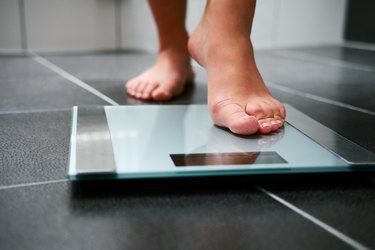
You're on a calorie-controlled diet and exercising regularly, but that darn scale isn't moving. You're frustrated, wondering why you're working so hard to slim down with no results. So, how is it possible that you're eating 1,200 calories (or whatever your limit is) and not losing weight?
Yes, weight loss occurs when you eat less and move more, but sometimes it's not just about calorie consumption — you need the right plan, too!
Video of the Day
Video of the Day
Here are eight reasons you may not be seeing results with your low-calorie diet and exercise routine, along with some advice on what you should do instead to get back on that weight-loss track.
8 Reasons Why You Might Not Be Losing Weight
These potential reasons may explain why you're not losing weight on a calorie-controlled diet:
1. Your Calories Are Actually Too Low
Getting too few calories may be hurting your weight-loss efforts. According to the Dietary Guidelines for Americans, weight-loss statistics show that for weight maintenance, the estimated daily caloric intake for adults is:
- Person assigned female at birth (AFAB): 1,600 to 2,400 calories
- Person assigned male at birth (AMAB): 2,400 to 3,000 calories
The low end of these ranges are for sedentary individuals and the high end is for those who are active. If you're active, then, you likely need at least 2,000 calories per day just to meet your everyday needs.
The "magic" number of calories to cut from that number is 500, according to the experts, because you're still able to meet your body's needs without depriving yourself of necessary nutrients.
With that in mind, 1,200 daily calories is probably too restrictive for most — and it could be the reason the scale isn't moving.
Cutting your calories too low can put your health at risk, according to Harvard Health Publishing. Your body needs a variety of foods for their nutrients and health benefits, but such a calorie-restricted diet requires cutting out a lot of those important foods out, per the Academy of Nutrition and Dietetics.
Vitamins, minerals, fiber and other nutrients shouldn't be pushed aside for a calorie target, as it could be detrimental to your immune system, bones, heart and other vital organs.
"When you're not consuming enough calories, your body may go into starvation mode, where it starts to store calories in order to fuel your body," Leah Kaufman, RD, CDN, tells LIVESTRONG.com.
"There are certain biological issues that may arise as well — you can start growing lanugo (fuzzy hair) to warm your body in the absence of energy being consumed," she says. "You may also have decreased energy without the necessary calories, nails may become brittle and you may have increased sensitivity to cold."
2. Your Metabolism Slowed
Believe it or not, being too diligent in your eating and exercise regimen can cause a slowdown in your metabolism.
If a 1,200-calorie diet creates a deficit of more than 1,000 calories and you're exercising on top of that, your body could hold up the calorie-burning process because it actually starts to adapt to such low calories. Think of it as a self-preservation tactic.
Adaptive thermogenesis often occurs right after initial weight loss, when your metabolism slowly adjusts to match your low calorie intake, according to an October 2016 article in Obesity Reports. As a result, weight loss slows down or grinds to a halt.
3. You're Underestimating Your Intake

You may think you're eating 1,200 calories (or whatever your calorie target is) and not losing weight, but unless you weigh and measure every morsel you put into your mouth, you can't be 100 percent sure that number is accurate.
A group of August 2013 studies in PLOS One concluded that most people tend to underestimate the calorie content of their food, especially when a main dish is paired with something nutritious.
So, if you're just eyeballing portions or think that a handful of chips here or a bite of cookie there won't do anything, you could actually be eating a lot more calories than your daily target.
4. There's No Food in Your Food
Not all calories are created equal, so what's actually in those 1,200 calories you're eating?
If you're hitting your target cals with chips and cookies — or even "diet foods" that are ultra-processed and lacking in nutrients — then you may be doing your diet a major disservice, and this may be the reason why you can't lose weight on 1,200 calories a day.
Indeed, it's all about where those calories are coming from and how they affect you metabolically, according to Harvard Health Publishing.
So if most of your food is coming out of a package with an ingredient list a mile long, try eating more whole foods instead, like fruits, vegetables, whole grains, lean meats and healthy fats like olive oil, nuts and seeds.
5. You've Hit an Exercise Slump

Exercise routines that look exactly the same day after day may cause you to hit a plateau, and could be the reason why you're not losing weight on low-calorie diet.
"Did you ever hear of the saying, 'If it doesn't challenge you, it doesn't change you?'" asks Laura Chapman, CPT, NASM-certified personal trainer and fitness-nutrition specialist.
"Your body has the ability to adapt to everything you do. It adapts to the calories you eat, the amount of cardio you do and the weights you lift. If you consistently lift weights that are comfortable to you, or do the same cardio regimen, the body will develop a tolerance, making it more efficient and therefore decrease caloric expenditure. You won't see the progress you're looking for until you make a change."
Chapman, a strong advocate for strength training, gave LIVESTRONG.com some tips on how to break through your slump and reach your goal:
- Avoid excessive amounts of cardio. It should be used to compliment your program and not something you rely on.
- Try 20 to 25 minutes of high-intensity interval training (HIIT) a few days a week. This type of workout gives you more bang for your buck when it comes to calorie expenditure throughout the whole day.
- Don't go into the gym without a plan. And remember, that plan should work for you and your lifestyle, not someone you saw on social media.
- Record your last weight and amount of reps for the last set of each exercise. The next time you do that workout, squeeze out a few more reps or increase the weight. If you did 15 pounds at 8 reps, then you could go to 12 reps the next time. Or if you did 15 pounds at 12 reps, then go to 20 pounds. The key is to push harder each time.
- Don't take long rest times, and don't spend precious exercise time looking on social media and taking selfies. Rest times should be anywhere between 45 seconds to 2 minutes depending on your program. If you're lifting heavier, then your rest times should be on the longer side.
- Try incorporating supersets, where you alternate between exercises to eliminate rest altogether.
6. You're Burnt Out
A large calorie deficit can make you feel kind of sluggish, and with regular gym sessions on top of feeling hungry — well, there's your excuse to take the elevator instead of the stairs. And if you do hit the gym, you may not be working as hard as you think because you're running on fumes.
Speaking of sluggishness — are you getting enough sleep? A July 2014 review in the Annals of Medicine links sleep deficits to snacking, decreased energy expenditure and changes in appetite-regulating hormone levels.
It also points the finger at multimedia usage for keeping you up at night. So, put down your phone and get some sleep! (Aim for seven to nine hours a night, per the National Sleep Foundation.)
7. You're Drinking Too Much Alcohol

A glass of wine or cocktail here and there is totally fine (as long as you're tracking those calories), but be aware that alcohol can slow down your metabolism too.
"When you consume alcohol, the body will shut down and prioritize the metabolism of the alcohol, especially in the liver," Chapman says.
"This leads to hormonal suppression and a decrease in testosterone. And any time testosterone is decreased, it decreases metabolic health, and a decrease in metabolic health means fat gain," she says.
Stick to a max of about one drink per day, as recommended by the American Heart Association. And if alcohol is your go-to way to unwind, try adopting different relaxation techniques.
8. You Have a Medical Issue
If you're positive that your calorie intake and exercise routine are on point, it might be time to see a doctor. Certain conditions like hypothyroidism, according to the American Thyroid Association, can make weight loss much more challenging.
"Your thyroid is the center for your hormones that control metabolism. Hypothyroidism is when your thyroid is working at a slower pace, making it more challenging to lose weight," Kaufman says.
"I always ask patients to get their TSH (thyroid-stimulating hormone) levels checked in conjunction with consuming a healthy diet if they are having difficulty losing weight," she says.
Some prescription medicines, such as steroids and antidepressants, also inhibit weight loss and may even cause weight gain. If you're concerned about your medication's side effects, talk to your doctor.
Risks of Having Too Low a Calorie Intake
If you're eating 1,200 calories a day and not losing weight, you may be tempted to restrict your intake even more. But this can be harmful to your health.
Remember, eating fewer than 1,200 calories typically doesn't provide enough fuel or nutrients, according to Harvard Health Publishing. In fact, calorie intake should not fall below 1,200 per day for people AFAB or 1,500 per day for people AMAB unless under the supervision of a doctor.
Per Johns Hopkins Medicine, if you don't get enough nutrients while following a low-calorie diet, it can lead to malnourishment and side effects like:
- Pale, thick and dry skin
- Bruising easily
- Rashes
- Changes in skin pigmentation
- Thin hair that is tightly curled and comes out easily
- Achy joints
- Bones that are soft and tender
- Gums that bleed easily
- Swollen, shriveled or cracked tongue
- Night blindness
- Increased sensitivity to light and glare
- Mood changes
- Weakened immune system
How to Get Your Weight Loss Back on Track

While there's isn't a one-size-fits all weight loss plan, if you're not seeing any results, you need to start making some changes. It's time to grab a calculator, start a new shopping list and get a new pair of workout gloves. Are you ready?
1. Calculate Your Calories
To figure out how many calories you really need in order to lose weight, you have to subtract the daily calorie deficit you're aiming for (for example, 500 to 1,000, to lose 1 to 2 pounds weekly) from your total daily energy expenditure (TDEE).
According to the American Council on Exercise (ACE), TDEE is the total amount of calories an individual burns in a given day. To estimate your TDEE, you first need to calculate your resting metabolic rate (RMR), which you can do by using the Mifflin-St Jeor equation.
Mifflin-St Jeor Equation to Calculate RMR
- Male: 9.99 x weight + 6.25 x height – 4.92 x age + 5
- Female: 9.99 x weight + 6.25 x height – 4.92 x age – 161
(Measure weight in kilograms, height in centimeters, age in years)
To calculate kilograms, divide the number of pounds by 2.2. To calculate centimeters, multiply the number of inches by 2.54.
The number you get is the best estimate of how many calories your body needs daily to just exist, without factoring in the calories you burn from physical activity. But you're not done….
Calculating TDEE
To estimate your TDEE, per ACE, you multiply your RMR by a number based on your activity level:
- Sedentary: Little to no exercise = RMR x 1.2
- Lightly Active: Light exercise 1-3 days per week = RMR x 1.375
- Moderately Active: Moderate exercise 3-5 days per week = RMR x 1.55
- Very Active: Hard exercise 6-7 days per week = RMR x 1.725
- Extremely Active: Hard daily exercise and a physical job = RMR x 1.9
So, let's say your RMR is 1,500 calories and you're moderately active — your daily TDEE is around 2,325 calories. If you want to lose 1 pound per week, you have to create a deficit of 500 calories, so your new daily calorie goal should be around 1,825.
Now keep in mind these equations aren't perfect, so you should adjust your calorie intake if you're legit hungry.

A balanced diet is the right kind of diet. In other words, you shouldn't restrict any food group when you're trying to slim down, according to Centers for Disease Control and Prevention.
Choose high-quality, nutritious foods like lean meats and fish, fruits and veggies, whole grains and good fats, and try to avoid trans fats (found in some snack foods and packaged sweets), added sugars and refined carbs like white bread and white rice when possible.
But you should also treat yourself every now and then, because a too-restrictive diet just isn't realistic for long-term weight loss and maintenance.
"Choosing more nutrient-dense foods will fill you up and leave you satisfied longer, and less likely to feel the need to pick or snack between meals," Chapman says.
"Calories in chicken, fish, potatoes and veggies will help you see results faster than choosing foods like pizza, ice cream or doughnuts. Everything in moderation. Remember, being too restrictive only leads to binge eating and yo-yo dieting," she says.
Meal Prep Plan
Not sure where to start? Try this sample menu for a day of nutritious eating:
- Breakfast (293 calories): Mediterranean Breakfast Scramble, 1 cup of mixed berries and 1 slice of whole-wheat toast with 1/2 teaspoon of butter or margarine
- Lunch (304 calories): Healthy Lunch Fish Tacos with 1/2 cup of diced mango
- Snack (141 calories): Celery and Carrots with Hummus Dip
- Dinner (399 calories): Spicy Bean Chili with Citrus Greens Salad
- Snack (84 calories): 1 pear
3. Grab Those Weights
Yes, cardio will torch a ton of calories, and experts do recommend you get at least 30 minutes of aerobic exercise two to three times per week, according to the Cleveland Clinic. But that means you need to fill in those gaps with other forms of activity, namely strength and resistance training.
Strength and resistance training are highly recommended because muscle mass increases metabolic rate. The more muscle you have, the more calories you burn daily.
An April 2014 study in Journal of Sports Sciences concluded that cardio plus resistance training had better results with regard to decreased body fat mass and increased lean muscle mass than with just cardio alone.
And an article in the July/August 2012 issue of Current Sports Medicine Reports showed that you can increase your resting metabolic rate by 7 percent by doing 10 weeks of resistance training.
The takeaway from all of this is that you shouldn't give up. With some tweaks to your diet and exercise routine, you'll get yourself on the right track to your long-term goals.
- USDA Dietary Guidelines 2015-2020, 8th edition
- Harvard Health Publishing: "Calorie Counting Made Easy"
- Academy of Nutrition and Dietetics: "4 Ways Low-Calorie Diets Can Sabotage Your Health"
- Obesity Reports: "Changes in Energy Expenditure with Weight Gain and Weight Loss in Humans"
- PLoS One: "Underestimating Calorie Content When Healthy Foods Are Present: An Averaging Effect or a Reference-Dependent Anchoring Effect?"
- Harvard Health Publishing: "There's No Sugar-Coating It: All Calories Are Not Created Equal
- Annals of Medicine: "Sleep Debt and Obesity"
- American Thyroid Association: "Thyroid and Weight"
- American Council on Exercise : "October 2012 Resting Metabolic Rate: Best Ways to Measure It — and Raise It, Too
- Centers for Disease Control and Prevention:"Healthy Eating for a Healthy Weight"
- Cleveland Clinic: "Where Does Body Fat Go When You Lose Weight?"
- Journal of Sports Sciences: “Aerobic Plus Resistance Training Was More Effective in Improving the Visceral Adiposity, Metabolic Profile and Inflammatory Markers Than Aerobic Training in Obese Adolescents”
- Current Sports Medicine Reports: "Resistance Training is Medicine: Effects of Strength Training on Health"
- National Sleep Foundation: "How Much Sleep Do We Really Need?"
- American Heart Association: "Alcohol and Heart Health"
- Johns Hopkins Medicine: "Malnutrition"
- Allergy, Asthma & Clinical Immunology: "A Practical Guide to the Monitoring and Management of the Complications of Systemic Corticosteroid Therapy"
- Mayo Clinic: "Antidepressants and Weight Gain: "What Causes It?"
- Mayo Clinic: "Why Do Doctors Recommend a Slow Rate of Weight Loss? What's Wrong With Fast Weight Loss?"
- Academy of Nutrition and Dietetics: "4 Metabolism Myths and Facts"
- Harvard Health Publishing: "Which Diet is Best for Long-Term Weight Loss?"